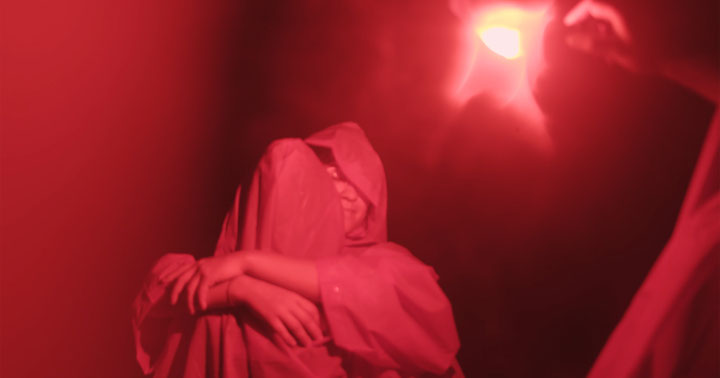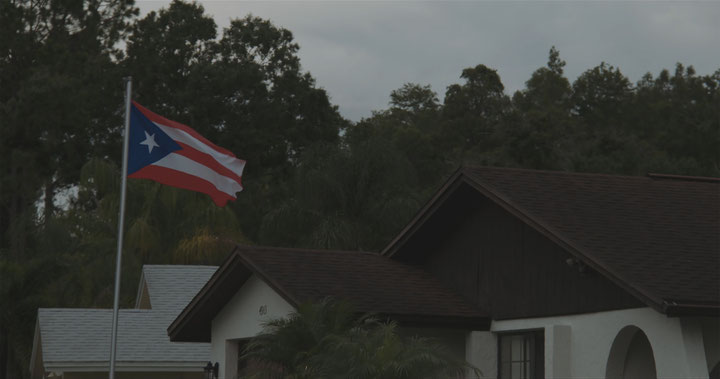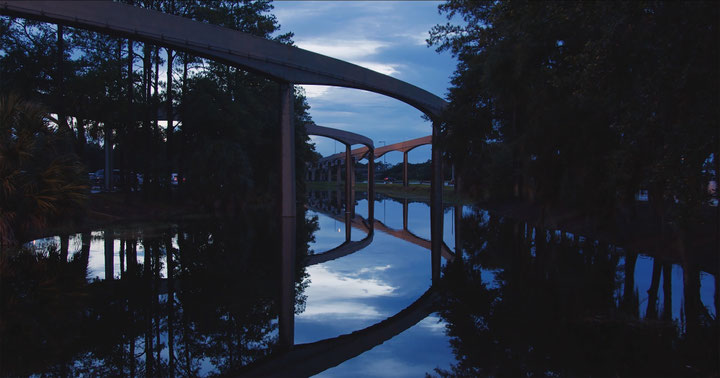The title of our film Foreign in a Domestic Sense1 refers to the oxymoron used by the United States Supreme Court in 1901 as part of the ruling that gave legal sanction to US colonization, identifying Puerto Rico as an “unincorporated possession” and speaking to our uniquely strange relationship. Our film was born out of a desire to get closer to and spend time with the fastest-growing Puerto Rican community in the US while placing our distinct artistic practices in dialogue and reflecting on the waves of displacement and hybridization that have shaped our history. Diasporic memory is fragmented and non-linear, and also foreign – past, present and future coexist, similar to how images and memories unfold in dreams.
For three years, we talked and listened closely to Puerto Ricans living in the central region of Florida, US, who shared their accounts of how Hurricane María and the larger political and economic crisis in the archipelago2 had forced them to leave, and how they contended with their new reality and surroundings. Our challenge was crafting a poetic visual language to accompany these stories and move past disaster porn toward other possibilities of self-representation. The result is a four-channel film that plays with structures and genres for documenting this migratory experience, woven together through a chorus of testimonies of people we met and spoke to along the way.
Although our project is grounded in a long research process, we are both very intuitive in how we shoot and edit, and we committed ourselves to fostering complicity with the people who participated in our project. We allowed the interviewees’ stories to guide our filming plans and our road trip through Florida. Our aim was to find and create connections by negotiating the distance between experiences we heard from others and our own impressions during the filming process. Since we share a background in theater, collective creation and improvisation were already embedded in the way we work. We experimented with different formal approaches, melding fiction, reality, and speculation with home movies, high-definition video, and hand-developed Super8 film. The structure of the film was inspired by Italo Calvino’s 1979 novel If on a Winter’s Night a Traveler,3 where a reader starts a new book in each chapter. This led us to conceptualize our piece as four potential beginnings to a film about the Puerto Rican diasporic experience in Central Florida through different stylistic and narrative approaches.
The formation of a community responds in part to the landscape and infrastructure of a place. In Central Florida with its sprawling streets and car-culture, we found out many people felt isolated. Others we spoke to mentioned that instead of feeling a part of a Puerto Rican community, they were more connected to a greater Caribbean and Latin American diaspora. The Pulse massacre in 20164 was the tragedy that first garnered visibility to the recent Puerto Rican migration wave to Orlando and these wider cultural diasporic alliances. It also spoke to gender and sexuality as additional reasons for migrating. The shooting happened during salsa night at the club, precisely the kind of social setting created for displaced queer Latinx people in order to find each other in a new city. During our research process, we found that this horrible event had been memorialized in problematic ways, white-washed and disneyfied, by the city government, the club owners and others. As a loving homage to those lost in the Pulse shooting, we decided to center the relationship between movement and freedom, showing the purple neon circle that remained on the club’s facade, yet refusing to participate in the commodification of grief.
The dance floor has always been an important space of resistance for queer people: to be free in their bodies and together in community. For us, this embodied defense of joy is also emblematic of the ways in which Puerto Ricans have survived culturally and emotionally through all sorts of catastrophes. We conceived this film departing from the belief that diasporas are engaged in collective practices that reorganize what community and nation means, and push the evolution and expansion of our shared identity.
In our film, we envisioned our collaborators as dancers who were trying to orient themselves on this new dance floor – Central Florida. We imagined a safe space that allows Puerto Ricans to “enter the risk of being together,” as performance scholar Ramón Rivera Servera describes the Queer Latin Nightclub.5 This reflection inspired the final scene of our film – a post-apocalyptic dance floor in a Tampa swamp. We brought together a group of people who were partly strangers to each other and invited them to dance slowly, finding comfort and warmth in each other. Borrowing an instruction work from Yoko Ono,6 we directed them to feel each other’s pulse, confirming each other’s presence and liveness.
For Puerto Ricans who oppose US colonialism, like us, the future is inextricably tied to an ongoing quest for freedom that may begin with ourselves and extend into our communities. The decolonization of the body is essential to the process of liberation. This holds a double meaning in our film: speaking to the body on the dance floor as well as the body that leaves one country for another without assimilating. Imagining the future is additionally complicated by the current ecological catastrophe which will soon turn Florida into an island. As the water that lurks throughout the state rises, the same kind of disaster that pushed Puerto Ricans to Florida will once again threaten them, like it continues to threaten us in the Caribbean. While our film engages this reality through metaphors and other poetic devices, it becomes increasingly difficult to find solace from the devastation and suffering caused by systems of planetary exploitation.
1 Foreign in a Domestic Sense, Dir. Natalia Lassalle Morillo & Sofía Gallisá Muriente, 2021, 32 min., 4k, Hi8 and HD video with hand developed Super8 film.
2 Puerto Rico has been in a severe debt crisis for at least the past 10 years, which prompted the US government to impose an undemocratic fiscal control board in 2016. The passing of Hurricane Maria in 2017, the worst natural disaster in the history of the archipelago, made the situation even more critical.
3 Italo Calvino, If on a Winter’s Night a Traveler, Turin 1979.
4 On June 12, 2016, Omar Mateen killed 49 people and wounded 53 more in a mass shooting at Pulse, a gay nightclub in Orlando, Florida. It is the deadliest incident in the history of violence against LGBTQI+ people in the United States and the second deadliest mass shooting in modern US history. 90% of the victims were Latinx, and half of those were of Puerto Rican descent.
5 S. Kornhaber, The Singular Experience of the Queer Latin Nightclub, The Atlantic, 2016 https://www.theatlantic.com/entertainment/archive/2016/06/orlando-shooting-pulse-latin-queer-gay-nightclub-ramon-rivera-servera-intrerview/487442/
6 Yoko Ono, Grapefruit, Tokyo 1964.




